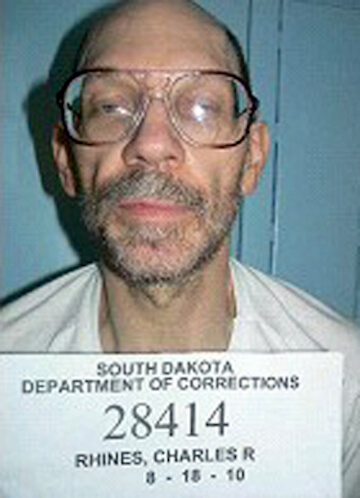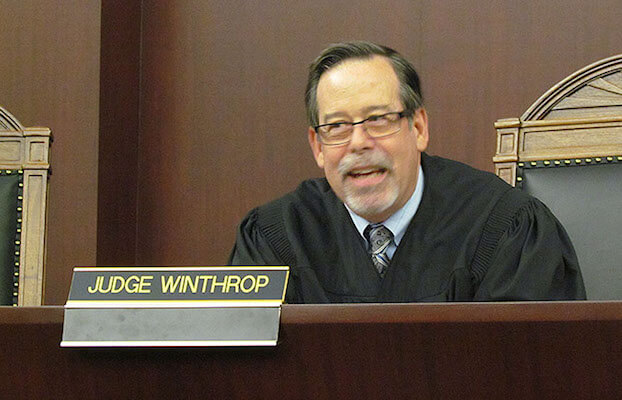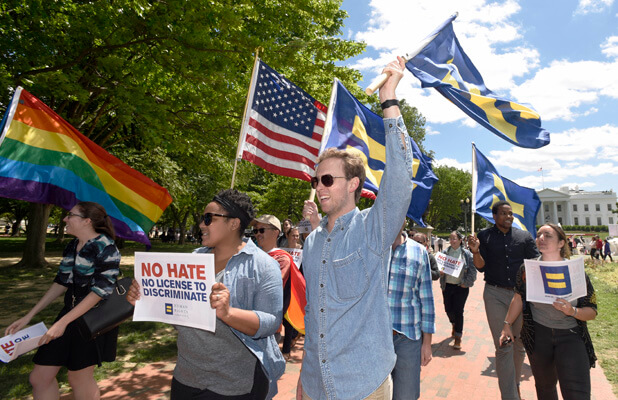Marisa and Terrah Pavan with their baby, whose birth certificate has both moms' names despite last month’s action by the Arkansas Supreme Court. | FACEBOOK.COM
A year and a half after the US Supreme Court ruled that same-sex couples have a constitutional right to marry, pockets of resistance remain in the states.
The latest example comes from Arkansas, where the state’s Supreme Court ruled on December 8 by a 4-3 vote that same-sex couples do not enjoy the same constitutional rights as different-sex couples when it comes to listing parents on birth certificates. The court’s majority rejected a challenge to two state laws under which wives of birth mothers are denied equal treatment with husbands of birth mothers in this matter. The three dissenters disagreed with the majority to varying extents in separate opinions.
The case was brought by three lesbian couples. Two of the couples, Marisa and Terrah Pavan and Leigh and Jana Jacobs, were married out of state and then had a child born in Arkansas, where they resided. The third couple, Courtney Kassel and Kelly Scott, had a child in Arkansas and married shortly thereafter. In all three cases, the Department of Health, headed by Dr. Nathaniel Smith, refused to list the spouse of the birth mother on the birth certificate, relying on gender-specific Arkansas statutes that provide for listing husbands but not wives of birth mothers.
State Supreme Court says marriage equality does not require listing biological mom’s same-sex spouse
The women, represented by attorney Cheryl Maples with amicus assistance from the American Civil Liberties Union of Arkansas and the national ACLU LGBT Rights Project, filed suit against Smith.
Pulaski County Circuit Judge Timothy Davis Fox accepted the plaintiffs’ argument that Smith, also a named defendant in Wright v. Smith, that state’s marriage equality lawsuit, was bound by the decision in that earlier case, which struck down as unconstitutional not only the state’s ban on same-sex marriage but also “all other state and local laws and regulations identified in Plaintiff’s complaint or otherwise in existence to the extent they do not recognize same-sex marriages validly contracted outside Arkansas, prohibit otherwise qualified same-sex couples from marrying in Arkansas, or deny same-sex married couples the rights, recognition, and benefits associated with marriage in the State of Arkansas.”
Fox also found support for his decision in the 2015 Supreme Court marriage equality opinion, noting that Justice Anthony Kennedy had mentioned “certificates of birth and death” as one of the benefits of same-sex marriage. Kennedy had written, “The challenged laws burden the liberty of same-sex couples, and they abridge central precepts of equality. The marriage laws at issue are in essence unequal: Same-sex couples are denied benefits afforded opposite-sex couples and are barred from exercising a fundamental right… The State laws challenged by the petitioners in these cases are held invalid to the extent they exclude same-sex couples from civil marriage on the same terms and conditions as opposite-sex couples.”
To Fox, this meant that married same-sex couples are entitled to the same rights of marriage as different-sex couples, including the same spousal rights regarding birth certificates.
But a majority of the Arkansas Supreme Court insisted that the US Supreme Court’s decision in Obergefell and the state court marriage equality ruling that preceded it had not decided this issue. Justice Josephine Linker Hart’s majority opinion argued that the only questions decided by these prior cases were whether same-sex couples could marry or have their out-of-state marriages recognized. Viewed this way, Smith was not precluded from applying Arkansas statutes to refuse to list the same-sex spouses on birth certificates unless the State Supreme Court were to decide independently that doing so violated the constitutional rights of the spouses. This the court was unwilling to do.
Since Fox’s ruling had not been stayed and the birth certificates the women sought were issued, the court considered the case as an on-its-face constitutional challenge to the two laws under dispute.
One of the challenged statutes provides that when a child is born to a married woman, her husband will be listed on the birth certificate as the child’s father unless either a court has determined that another man is the child’s biological father or the mother, the biological father, and her husband have executed affidavits establishing that the husband is not the biological father.
The other challenged statute provides that when a child is born to an unmarried woman, only she will be listed on the original birth certificate, but a new birth certificate can be issued listing the biological father if the child is “legitimated” by the biological parents subsequently marrying or a court determines who the biological father is.
The court insisted both laws are clearly intended to record historical facts about the biological parents of a child, and that the state has a legitimate reason to want the original birth certificate to correctly list these historical facts. Justice Hart quoted an affidavit submitted by Melinda Allen, the state’s registrar of vital records, contending that recording biological parents was “critical” to the department’s “identification of public health trends” and that “it can be critical to an individual’s identification of personal health issues and genetic conditions.” Allen noted that in adoption and surrogacy situations, the biological parents are listed on original birth certificates, which are then “sealed” when new certificates are issued showing adoptive or intended parents, since the state deems it essential that a permanent record of biological parentage be preserved.
Hart said that Judge Fox had “conflated distinct categories of marriage, parental rights, and vital records,” and that the issue was not who can be a parent but rather who must be listed on a birth certificate.
On the question of whether equal protection of the law is implicated by this case, the court found that the same-sex spouse is not similarly situated to the husband, and “it does not violate equal protection to acknowledge basic biological truths.” The majority held that “the challenged classification serves important governmental objectives” outweighing the claims of the spouses.
The couples did not challenge a third Arkansas statute that provides that a husband will be listed on the birth certificate in cases where his wife is artificially inseminated so long as he gives written consent to the procedure –– perhaps because the spouses here had not provided such authorization. The attorney representing Smith conceded that this third law does create equal protection problems in cases of same-sex spouses.
In a concluding paragraph, the court “admonished” Fox for having made a public statement that if the Arkansas Supreme Court granted a stay of his order in this case, it would be depriving people of their constitutional rights.
“A remark made to gain the attention of the press and to create public clamor undermines ‘public confidence in the independence, integrity, and impartiality,’ not only of this court, but also of the entire judiciary,” wrote Hart. Fox was formally “admonished” for “his inappropriate comments made while performing the duties of his judicial office.”
Chief Justice Howard Brill, in a separate opinion, agreed with the majority that Obergefell was a narrow holding that same-sex couples have a right to marry but did not directly settle the question of birth certificates. However, he wrote, “The question here is the broader impact of that ruling as it affects birth certificates,” and he added, “The logical extension of Obergefell, mandated by the Due Process Clause and the Equal Protection Clause, is that a same-sex married couple is entitled to a birth certificate on the same basis as an opposite-sex married couple,” because “the right to a birth certificate is a corollary to the right to a marriage license.”
Arguing that it was high time the Legislature amended its laws in compliance with Obergefell, Brill wrote, “The times they are a-changin’. All three branches of the government must change accordingly. It is time to heed the call.”
In her separate opinion, Justice Rhonda K. Wood pointed out that this litigation had stimulated the Health Department to modify its procedures, noting that Allen’s affidavit stated that the department “will issue birth certificates listing both same-sex parents if the hospital submits documentation reflecting that fact,” although the plaintiffs, during oral arguments, disputed how consistently this new policy is being implemented.
However, departing from the majority, she wrote that in her view, “states cannot constitutionally deny same-sex couples the benefits to marital status, which include equal access to birth certificates,” and suggested that the Legislature should amend the statute to comply with this conclusion.
Justice Paul Danielson dissented totally from the majority opinion, stating that he would affirm Fox’s ruling, agreeing that the state court’s marriage equality ruling and Obergefell settled the matter and the statutes as written were clearly unconstitutional.
Wood and Danielson dissented from the majority’s admonishment of Fox, Danielson arguing at length that it violated Fox’s constitutional free speech rights, and citing a US Supreme Court decision he said “cautioned against repressing speech under the guise of promoting public confidence in the integrity of the judiciary. In short, the fact that members of this court have personally taken offense to the circuit judge’s remarks is not a sufficient basis for suggesting that those remarks violate our disciplinary rules.”




































